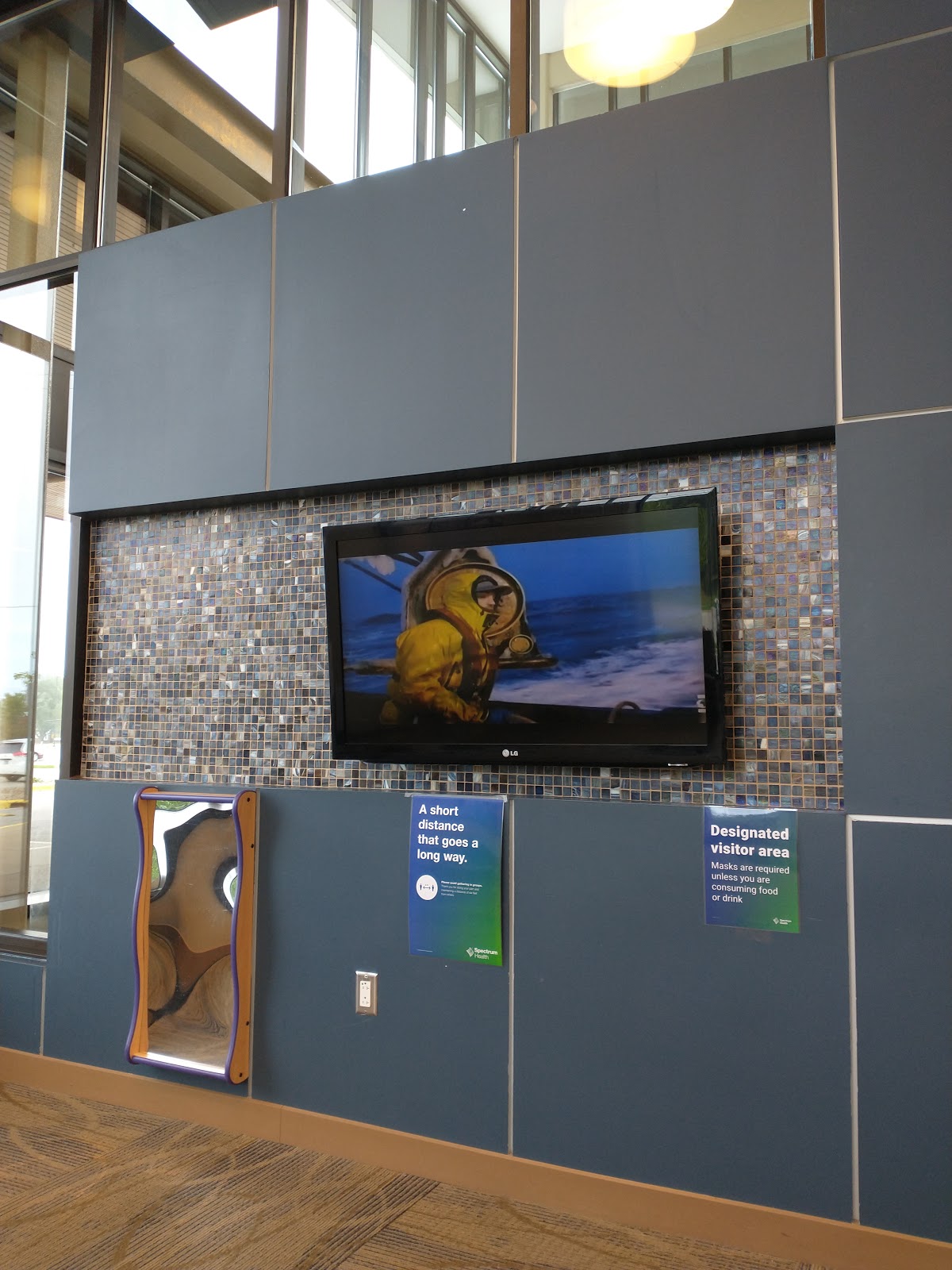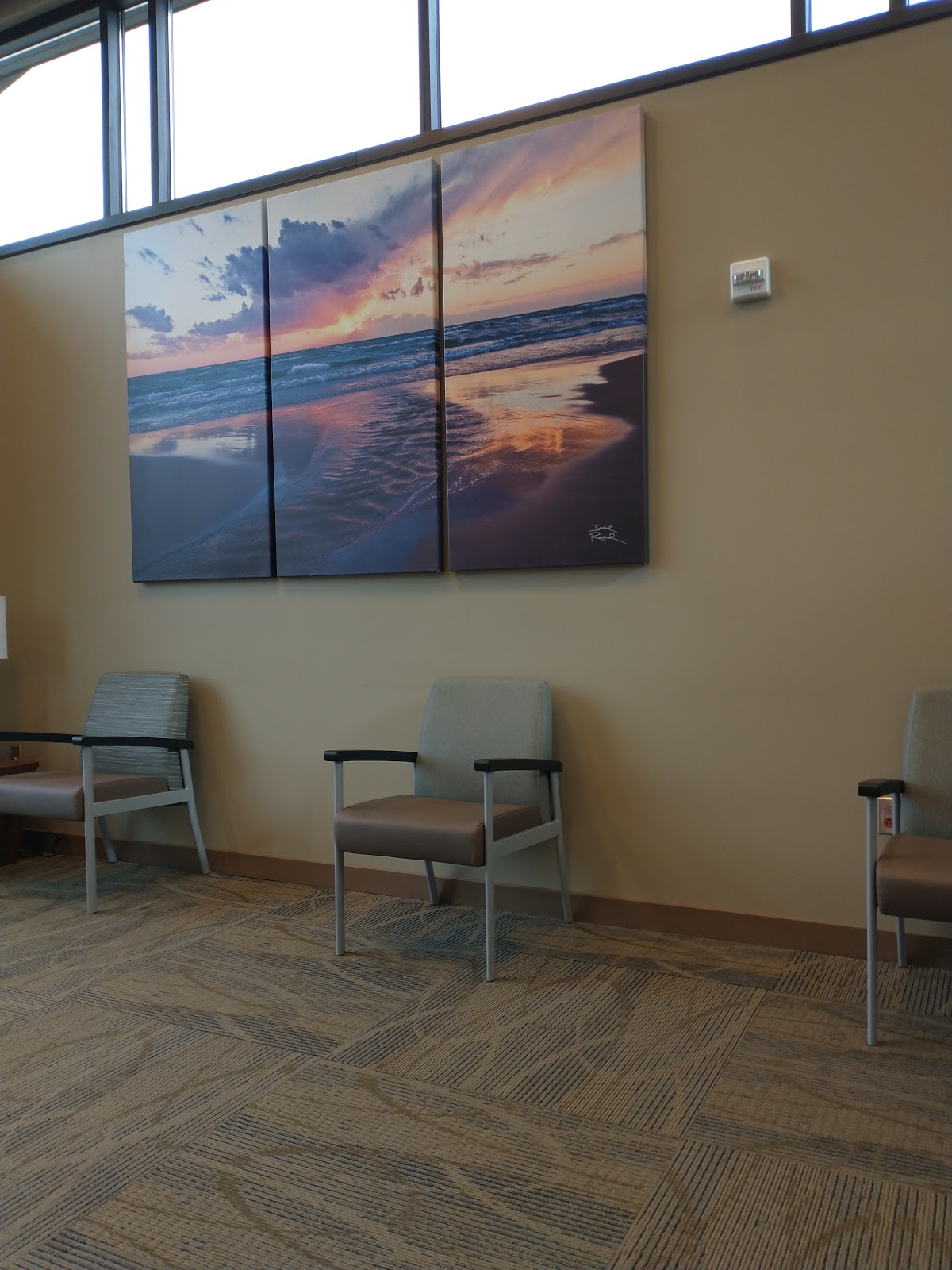Overview
Spectrum Health Ludington - Psychiatry is a mental health treatment center for people seeking treatment near Mason County. As part of their treatment modalities for recovery, Spectrum Health Ludington - Psychiatry provides family counseling, individual psychotherapy, and cognitive behavioral therapy during treatment. Spectrum Health Ludington - Psychiatry is located in Ludington, Michigan, accepting medicaid for treatment.
Spectrum Health Ludington - Psychiatry at a Glance
Payment Options
- Medicaid
- Private health insurance
- Cash or self-payment
- State-financed health insurance plan other than Medicaid
- State mental health agency (or equivalent) funds
Assessments
- Comprehensive mental health assessment
Age Groups
- Adults
- Young adults
Operation
- Private for-profit organization
Treatment At Spectrum Health Ludington - Psychiatry

Conditions Treated
Mental health treatment:
Mental health treatment involves various therapies and support services provided by licensed professionals to address mental health issues. These interventions, which can include therapy, medication, and holistic approaches, aim to enhance well-being, improve coping, and empower individuals to lead fulfilling lives. It's personalized, comprehensive care for mental health challenges.

Levels Of Care
Hospital inpatient treatment:
Inpatient treatment includes an all-encompassing residential therapeutic regimen, during which patients reside on-site for a period usually spanning 30 to 90 days. Within this immersive setting, individuals receive structured assistance, prioritizing their safety and fostering a dedication to recovery. The treatment modalities offered may include individual and group counseling, cognitive-behavioral therapy, holistic interventions, family therapy sessions, as well as experiential therapies. The overarching objective is to comprehensively address the physical, emotional, and psychological dimensions of addiction or mental health disorders, establishing a resilient groundwork for long-term healing.

Treatment Modalities
Family counseling:
Studies consistently show that the likelihood of sustainable recovery increases when family members are involved in rehab and substance abuse treatment. Genetic elements might influence susceptibility to drug and alcohol dependence and mental health challenges. Family interactions frequently contribute to addiction triggers. However, with the right education, family members can become pivotal support pillars during rehabilitation.
Individual psychotherapy:
Individual therapy, often referred to as psychotherapy or counseling, is a one-on-one therapeutic interaction between a trained therapist and a client. It provides a confidential space for individuals to explore their feelings, beliefs, and behaviors, working through challenging memories, experiences, or emotions. The therapist facilitates self-awareness, promotes personal growth and insight, and offers coping strategies to manage specific issues like stress, anxiety, depression, and other life challenges. The ultimate goal is to improve the individual's mental well-being and enhance their overall quality of life.
Cognitive Behavioral Therapy:
Cognitive Behavioral Therapy (CBT) is a evidence-based psychological treatment that focuses on identifying and challenging negative thought patterns and behaviors. It aims to develop coping strategies and promote healthier thinking to address a variety of mental health issues, such as depression, anxiety, and stress. CBT is typically short-term and goal-oriented, emphasizing the role of thought processes in influencing emotions and behaviors.
Dialectical Behavior Therapy:
Dialectical Behavior Therapy (DBT) is an evolved version of Cognitive Behavioral Therapy (CBT) that aims to assist individuals in recognizing and influencing the interplay among their thoughts, emotions, and actions. DBT is particularly beneficial for those grappling with self-harming behaviors, including self-inflicted injuries like cutting, as well as suicidal ideations or tendencies. Clinically, it has shown effectiveness in managing intense emotions and conditions such as Borderline Personality Disorder.
Nicotine replacement:
Nicotine Replacement Therapy (NRT) is a medically-approved method to aid individuals in quitting smoking. It provides a controlled and lower dose of nicotine to alleviate withdrawal symptoms and cravings, facilitating a smoother transition towards a nicotine-free life. By bypassing the harmful substances found in cigarettes, NRT offers a safer alternative while individuals work on overcoming their addiction.
Group counseling:
Group Counseling is a therapeutic approach where individuals come together under the guidance of a trained counselor to share experiences, provide mutual support, and gain insights. It fosters a sense of community, promotes understanding through diverse perspectives, and offers personal growth and problem-solving strategies.
Experiential Therapy:
Experiential Therapy is a therapeutic approach that emphasizes direct experience and active client involvement to gain insight into unresolved issues and trauma. Through guided activities, role-playing, and other interactive techniques, clients are encouraged to confront and explore their emotions in the present moment, leading to a deeper understanding and resolution of their challenges. This therapy is rooted in the belief that transformative change occurs through meaningful experiences.
Nutrition Therapy:
Nutrition therapy, aka medical nutrition therapy (MNT), treats physical, emotional, and medical conditions through diet. Specific dietary plans are designed by professional nutritionists or registered dietitians, and patients follow them in order to affect their physical and mental health positively.
Marital/couples counseling:
Whether a marriage or other committed relationship, an intimate partnership is one of the most important aspects of a person's life. Drug and alcohol addiction affects both members of a couple in deep and meaningful ways, as does rehab and recovery. Couples therapy and other couples-focused treatment programs are significant parts of exploring triggers of addiction, as well as learning how to build healthy patterns to support ongoing sobriety.
Trauma-related counseling:
Trauma therapy addresses the deep-seated emotional and psychological wounds often linked with substance abuse disorders. Recognizing that traumatic experiences can be a root cause or a significant contributing factor to substance addiction, this therapeutic approach seeks to help individuals understand, process, and heal from their traumas. Doing so fosters emotional healing and bolsters the individual's chances of long-term recovery from addiction. Integrating trauma-informed care into addiction treatment ensures a comprehensive approach that addresses substance abuse's symptoms and underlying causes.
Ancillary Services
Languages
- Sign language services for the deaf and hard of hearing
- Spanish
Special Programs
- Clients with HIV or AIDS
- Active duty military
- Clients who have experienced trauma
- Persons 18 and older with serious mental illness (SMI)
Contact Information
DISCLAIMER: The facility name, logo and brand are the property and registered trademarks of Spectrum Health Ludington - Psychiatry, and are being used for identification and informational purposes only. Use of these names, logos and brands shall not imply endorsement. BetterAddictionCare.com is not affiliated with or sponsored by Spectrum Health Ludington - Psychiatry.


